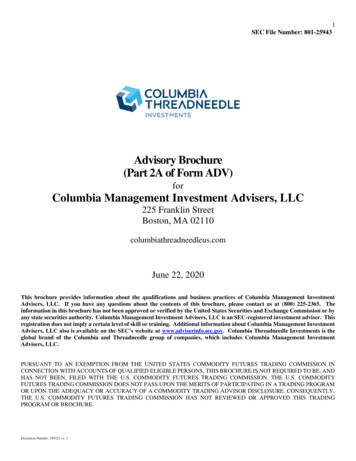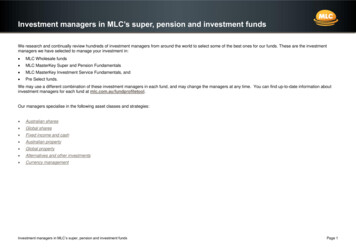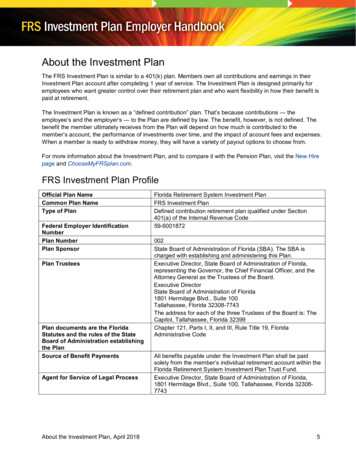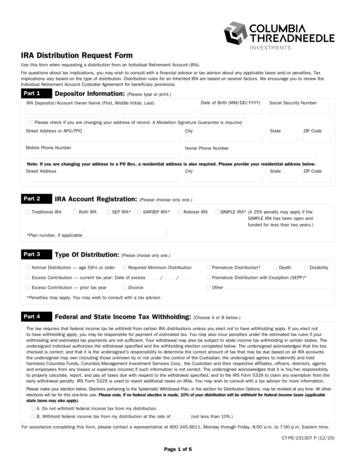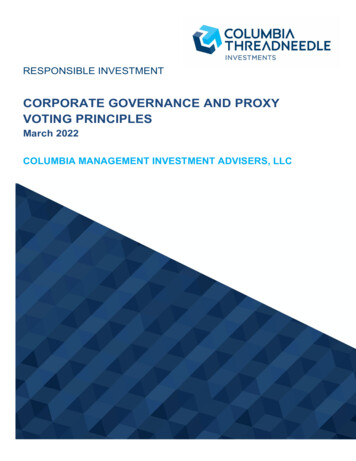
Transcription
RESPONSIBLE INVESTMENTCORPORATE GOVERNANCE AND PROXYVOTING PRINCIPLESMarch 2022COLUMBIA MANAGEMENT INVESTMENT ADVISERS, LLC
RESPONSIBLE INVESTMENTCorporate Governance and Proxy Voting PrinciplesThis document sets out our views and more detail on key issues and the broad principles that help shape our approachas we seek to votes proxies in clients’ best long-term economic interests pursuant to our Proxy Voting Policy.As active investors, well informed investment research and stewardship of our clients’ investments are importantaspects of our responsible investment activities. Our approach to this is framed in the relevant Responsible InvestmentPolicies we maintain and publish. These policy documents provide an overview of our approach in practice (e.g.,around the integration of environmental, social and governance (ESG) and sustainability research and analysis).As part of this, acting on behalf of our clients and as shareholders of a company, we are charged with responsibility forexercising the voting rights associated with that share ownership. Unless clients decide otherwise, that forms part ofthe stewardship duty we owe our clients in managing their assets. Subject to practical limitations, we therefore aim toexercise all voting rights for which we are responsible, although exceptions do nevertheless arise (for example, due totechnical or administrative issues, including those related to Powers of Attorney, share blocking, related option rights orthe presence of other exceptional or market-specific issues). This provides us with the opportunity to use those votingrights to express our views on relevant aspects of the business of a company, to highlight concerns to the board, topromote good practice and, when appropriate, to exercise related rights. In doing so, we have an obligation to ensurethat we do that in the best long-term economic interests of our clients and in keeping with the mandate we have fromthem.Corporate governance has particular importance to us in this context, which reflects our view that well governedcompanies are better positioned to manage the risks and challenges inherent in business, capture opportunities thathelp deliver sustainable growth and returns for our clients. Governance is a term used to describe the arrangementsand practices that frame how directors and management of a company organize and operate in leading and directing abusiness on behalf of the shareholders of the company. Such arrangements and practices give effect to themechanisms through which companies facilitate the exercise of shareholders’ rights and define the extent to whichthese are equitable for all shareholders.We recognize that companies are not homogeneous and some variation in governance structures and practice is to beexpected. In formulating our approach, we are also mindful of best practice standards and codes that help frame goodpractice, including international frameworks and investment industry guidance. While we are mindful of company andindustry specific issues, as well as normal market practice, in considering the approach and proposals of a companywe are guided solely by the best long-term economic interests of our clients along with their mandate and will considerany issues and related disclosures or explanations in that context.SHAREHOLDER RIGHTSThe shareholder membership of listed companies is generally made up (directly or indirectly) of diverse individuals andinstitutions whose views, interests, goals and time horizons can vary considerably.Nevertheless, as shareholders, having confidence that the capital we commit to a company will be protected frommisuse (e.g. from any potential agency conflicts) and will be prudently managed is important to us, our clients, and as afactor in the development and proper functioning of capital markets.It is not the role of shareholders to micromanage businesses, rather it is the role and duty of directors to promote thelong-term success of their company as noted in the next section. Nevertheless, by virtue of their share-ownershipinterest and position, shareholders are afforded certain rights to ensure, amongst other things, that appropriateleadership of the business is in place (e.g. through the appointment of the directors), review their performance (e.g.through receipt of the annual report & accounts, updates and general meetings), approve the broad parameters of thecompany’s authorities (e.g. in agreeing capital authorities), approve the appointment or ratification of external auditors,or indeed to exercise other rights afforded to shareholders (e.g. to requisition matters for consideration at Generalmeetings).Shareholder rights, framed in law, regulation and a company’s formational documents (i.e., bylaws or articles of
association), are an important and integral part of corporate governance frameworks and the context in which we retainconfidence in committing capital to businesses, to support their growth, development and success. This is particularlytrue in terms of ensuring that minority shareholders’ rights and interests will be respected. Arrangements or actions thatdetract from these rights and interest (including control distortions) need to be avoided.While the precise nature and scope of shareholder rights vary across jurisdictions and many related aspects of ourexpectations are touched upon in other parts of these Principles, a number merit direct mention in this context:Equal treatment of all shareholdersOne share one vote: Ordinary or common shares should feature one vote for each share and discriminatory votingrights or equivalent arrangements are neither appropriate nor welcome. Companies need to disclose sufficientinformation about the key attributes of all of the group’s capital structure (including minority interests in subsidiaries) toenable a proper understanding of the structures in place and their implications.Controlling shareholder agreements: where a company has a controlling shareholder (whether by virtue of the controlof voting rights or through board representation) it should put an agreement in place to safeguard the independence ofthe company and ability of the board to fulfill its duties to the shareholders as a whole.Shareholder approvalsBoards should ensure that shareholders have the ability and right to: effectively exercise their voting rights across the full range of business normally associated with general meetingsof a company in line with market best practice (e.g. the election of individual directors, discharge authorities, capitalauthorities, auditor appointment, major or related party transactions etc.). place items on the agenda of general meetings, and to propose resolutions subject to reasonable limitations; call a meeting of shareholders for the purpose of transacting the legitimate business of the company;and that shareholder rights are not circumvented through, for example, the introduction or maintenance oflimitations in the company’s formational documents.Shareholder engagementBoards should ensure that: Clear, consistent and effective reporting to shareholders is undertaken at regular intervals and that they remainaware of shareholder sentiment on major issues to do with the business, its strategy and performance. Wheresignificant shareholder dissent is emerging or apparent (e.g. through the voting levels seen at General Meetings),boards should act to address that. Boards should also allow a reasonable opportunity for the shareholders at a general meeting to ask questionsabout or make comments on the management of the company, and to ask the external auditor questions related tothe audit.As an institutional shareholder, stewardship is about more than just voting and include monitoring and reviews ofcompanies’ activities and developments. Where appropriate it may also include engagement with companies onmatters such as strategy, performance, risk, capital structure, standards of operational practice, includingenvironmental, social and governance factors. Our broad approach to these stewardship responsibilities and activitiesare set out in our Global Stewardship Statement.Shareholder resolutionsShareholder resolutions represent the exercise of a key shareholder right and may encompass a wide range of issues.As such, we assess shareholder resolutions in light of good practice, the standards already applied by a company, howproportionate the proposals are, their alignment with our philosophy and approach, as well any potential conflicts withour clients’ interests. We will incorporate into our decision whether a shareholder resolution is binding in nature oradvisory (non-binding) in applying these considerations.
THE BOARDStrong corporate governance starts with a balanced, effective, and independent board. The directors are goingevolutionintheleadershipofthecompany, within a framework of prudentand effective oversight, policies and controls.The board is thus responsible for providing leadership to the business, setting and monitoring the strategy, overseeingits management and implementation, as well as for ensuring that a culture of integrity and strong standards ismaintained across all activities and operations. Not least this should enable business opportunities and risk to beassessed and responded to appropriately.Boards need to have appropriate independent membership and an effective balance and diversity (re: skills,knowledge, experience, race/ethnicity, gender, approach and perspectives) that complements the strategy, operationsand footprint of the business. For non-executive (supervisory) directors (NEDs), the ability to provide objective inputand scrutiny, on behalf of the shareholders, is essential in ensuring diversity of thought and integrity in boarddeliberations. In this context, the importance of true independence of thought is critical. NEDs need to be reflective andthoughtful in their approach, being able to ask challenging, often difficult questions, while offering considered andconstructive input to board discussions, based on sound judgement. The same holds true in terms of board committeemembership.Suitably independent committees are one important mechanism for non-executive supervisory directors to achieve this,whether that is in respect of risk, audit, succession or remuneration, so as to enable them to participate effectively aspart of the board and in their role as directors of the business.As part of this dynamic, well considered succession planning, orientation, on-going briefings, updates and annualevaluations (that make regular use of external facilitation) of the board, its sub-committees and members are essential.All directors should be able to allocate sufficient time to the company to discharge their responsibilities fully andeffectively and have an appropriate knowledge of the business and access to its operations and staff. Given theimportant role and duties of a board member, it is important that directors are not over-boarded and can maintainconsistent participation at all their board and committee meetings and their wider engagement with the companies theylead.All directors should be subject to annual election. However, in markets where that is not normal or best practice, weexpect all directors to be subject to re-election in line with local market best practice, but in any case, at least everyfour years. At the same time, arrangements that might entrench boards or management, or otherwise insulate themfrom accountability, should be avoided.Given their role and duties, directors should also ensure that they are well informed about the views and/or concerns ofshareholders, as well as understanding the dynamic around their broader stakeholders (including bondholders,pension fund trustees, employees, customers, suppliers and the communities they operate in).CHAIR OF THE BOARDThe Board Chair has a crucial function in providing leadership in the boardroom, setting the right context in terms of theboard’s overall responsibility for the oversight of the business and its strategy. It is the Board Chair’s role to managethe board agenda and the provision of information to directors, as well as to ensure open boardroom discussion thatenables the directors to have effective dialogue and provide the constructive challenge that a company needs. Thisrole is distinct from the role of a chief executive officer who leads the day-to-day running of the business andimplementation of the strategy.We expect the Board Chair (or lead/senior independent director) to ensure that the board is aware of the views andconsiders concerns raised by shareholders, whether through ongoing dialogue and engagement with shareholders orwhere notable dissent has been indicated through shareholder voting. We recognize that in some markets thecombination of roles is not uncommon, nevertheless we regard the separation of the roles of the Board Chair and theCEO to be a matter of good practice and governance. In light of experience, we consider that this separationencourages collegial decision-making on matters of importance for a public company, and a balanced board, and italso mitigates potential conflicts of interest. Not least it also helps mitigate against the risk of a concentration ofdecision-making powers in the hands of a single individual. Separation is deemed to improve the board’s capacity forindependent decision making and increases accountability.
The Chair of the Board’s role should be complemented by an independent non-executive director appointed as thesenior or lead independent director, who can provide a sounding board for the chair and serve as a deputy andintermediary for the other directors and, indeed, shareholders when necessary.CAPITAL MANAGEMENTPrudent capital management is a key building block for the long-term success of a business, supporting the strategyand ensuring its ability to weather adverse economic conditions. Clarity on the capital structure plans, relateddisciplines and how they relate to the strategy for growth, capital investment and M&A, or to share buybacks, dividendsand/or other distributions, is a critical ingredient in building a shared understanding of the business with shareholdersand other providers of capital.From a shareholder perspective the rationale for and potential dilution from equity capital issuances and, for example,the risks of poorly timed or structured share buybacks are important considerations in granting capital authorities atshareholder meetings. These activities can have significant implications and need to be approached by boards andmanagement with care and consideration for shareholder interests.In seeking shareholder approval for equity capital issuance authorities, companies should ensure the rationale forpolicy on, and approach to, the use of such authorities is disclosed. Routine disapplication of pre-emption rights (prorata rights of first refusal) should not exceed 10% (or lower where that is market practice) and authorities should bestructured in line with best practice.Similarly, prudent management of debt through the cycle is important. Boards should ensure they monitor and overseethe maintenance of prudent levels of debt (e.g. average net-debt not just the year-end position) and leverage in thebusiness and balance sheet, which should extend to contingent and off-balance sheet liabilities. They should alsoensure that sudden spikes in leverage can be explained in the context of the broader long-term business strategy.Large, unexplained or unjustified authorities to issue debt, or to increase or remove debt limits set out in a company’sformational documents, can raise potentially significant concerns for both long-term shareholders and bondholders,which the board needs to be mindful of.Taking on debt solely to fund buybacks and/or hit ‘per-share’ targets such as EPS established under short-termvariable remuneration schemes should be explained and a robust rationale provided.Any exceptional cases should be supported by a substantive justification and explained properly to shareholders.MAJOR TRANSACTIONSMergers, acquisitions, joint ventures and disposals are a regular feature of business and the capital markets. In manycases these are a normal part of the management and development of a business and the implementation of itsstrategy. However, large, inappropriate or poorly executed transactions can also lead to operational issues, significantwrite-downs and shareholder value destruction.Boards should be actively involved in the planning for and assessment of potential transactions, ensuring that anappropriately disciplined approach (to both acquisitions and disposals) is maintained that is clearly aligned with thestrategy. Ensuring appropriate and effective oversight of such activity is critical and monitoring the integration andsubsequent performance against plan and related objectives (including synergies) is an important role of the board.Where major transactions are not subject to shareholder approval, companies should consider the views of their majorshareholders, subject to regulatory constraints and shareholders’ policies on being made “insiders”.RELATED PARTY TRANSACTIONSThe scope for conflicts and abuse in related party transactions in any market is a potentially significant issue. Suchconcerns can arise in relation to individual transactions or from the number, nature or pattern of them. Alongsideappropriate procedures to identify and manage conflicts of interest, boards should have a robust, independent processfor reviewing, approving and monitoring related party transactions (both individual transactions and in aggregate).A committee of independent directors, with the ability to take independent advice, should review related partytransactions, their nature and their incidence or aggregate levels, to determine whether they are necessary,appropriate and in the best interests of the company and, if so, agree what terms are fair for other shareholders. All
related party transactions should be reported to the board and be subject to approval.The company should also disclose transactions that are significant, whether by virtue of their materiality to thebusiness, the individuals involved or given the risk of perceived conflicts of interest, along with the rationale for allowingthem.Where a related party transaction is allowed to proceed it must be: subject to proper oversight by the board and regular review (e.g. audit, shareholder approval); clearly justified and not be detrimental to the long-term interests of the company; undertaken in the normal course of business; undertaken on fully commercial terms; in line with best practice; and in the interests of all shareholders.TAX MANAGEMENTTax management approached prudently and legally, is part of the responsible management of a company’s affairs.Artificial or ‘aggressive’ tax strategies and constructs create imprudent risks for a company.They can pose potentially significant reputation and commercial risks for those that are, or are perceived to be, pushingthe boundaries of tax practice by, for example, exploiting loopholes and tax havens to avoid paying tax. The samereputation risks hold in respect of the directors of companies involved in such practices and the perception of theculture and attitudes it evidences. This applies equally to the use of tax avoidance structures in executivecompensation arrangements, as it does at a corporate level.From an investor perspective, tax management offers an insight into the culture predominant in a company and theattitudes and risk appetite of the management and directors. It also offers an additional indicator on the quality ofearnings, risk and potential liabilities of a business, which can be relevant in terms of valuation and the investmentquality of a business.We expect the board to take a responsible approach to overseeing a company’s approach to and policy on tax and therelated risks, to ensure that the company’s approach is and remains prudent and sustainable. The risks arising fromengineered tax optimization practices should be understood and avoided; those arising from policy reforms (e.g. thosebeing coordinated by the Organisation for Economic Co-Operation and Development (OECD) and other authorities)should be properly mitigated. The board should regularly review the business’s tax policy, its implementation and therelated risks, as well as in response to significant events that may affect it. A summary of the tax policy and relatedcodes of conduct should be published by companies, highlighting the approach to managing the associated risks.In terms of changes in tax domicile or re-incorporation, while economic benefit may be gained, there should be nodiminution of shareholders rights as a result of the changes, nor triggering of variable compensation as a result of theassociated technical, legal or structural changes required.ANNUAL REPORT AND ACCOUNTSAnnual reports and accounts are a key reference document for shareholders and the providers of a company’s longterm capital. They should provide a summary account of the board’s stewardship of the business that year (as opposedsay to being designed or prepared for a secondary market context i.e. decision usefulness), whilst setting a direction oftravel for the future.In the annual report, the board should present a fair, balanced and understandable assessment of the company’sstrategy, business plan, objectives, KPIs, capital and assets, operations, risks, challenges, performance and prospectsin its annual report. This should include how the business’ approach is adapting to major trends (e.g. from technology,climate change or demographics etc.) that could have a material impact on the business and the related risks andopportunities it sees and how they affect the sustainability of the business and its long-term prospects.The annual financial statements (accounts) need to be prepared on a prudent basis and present a true and fair view ofthe state of affairs of the business, its assets, liabilities, financial position and distributable profit or the loss. Boardsshould ensure that aggressive accounting practices are avoided and recognize that headline compliance withaccounting standards, where significant judgement and discretion can be used, is unlikely of itself to effectively provide
comfort that a ‘true & fair view’ is being maintained. Boards should ensure company practice does not fall into the trapof accounting form over substance.The annual report and accounts are a reflection of the quality and prudence of management and the board of directors.Managements should strive for perfection in delivering these important documents. Errors and omissions mayultimately factor in our view toward the constitution and effectiveness of management and the board.While recognizing the differences that exist in market norms and dynamics, we expect companies to plan for and lookto the long-term in their reporting. The board should ensure that the company does not become fixated on quarterlynumbers at the expense of investment for the long-term.EXTERNAL AUDITThe statutory audit is a significant and important shareholder and creditor protection mechanism, to which we attachconsiderable importance. Its purpose is to protect the company itself from errors, omissions or, potentially, wrongdoing,as well as to signal any issues to shareholders to enable them to engage with the directors, not least through thegeneral meeting.Companies should, therefore, ensure that the relationship with the auditor is clearly owned and overseen by the AuditCommittee and that they maintain a robust, independent and effective audit and that the auditors are and are seen tobe independent. As part of this, companies should have a clear policy on the approach to and general timeframesrelating to re-tendering the audit contract.Non-audit work should be kept to a minimum, require prior audit committee approval and largely be restricted to auditrelated work. Audit committees should also oversee any work undertaken by other audit firms to ensure that thecompany’s options and choice of alternative auditors is not compromised by potential conflicts.INTERNAL AUDIT AND RISK COMMITTEESCompanies need to maintain an effective system of internal control, which should be measured against internationallyaccepted standards of internal audit and tested periodically for its adequacy.Companies are encouraged to have an internal audit function that supports the board and executives in the oversightand management of risks. We expect financial institutions to maintain a separate risk committee and support thispractice, where appropriate, in other companies.COMPENSATION/REMUNERATIONExecutive pay has been a persistent area of concern and controversy over the years. Given the problems aroundexecutive pay inflation, widening pay differentials, questions about the linkage with performance and perceivedrewards for failure, and complexity, compensation(remuneration) committees need to ensure a prudent approach ismaintained.We expect a substantial proportion of executive pay to be performance based, vesting according to the achievement ofstretching performance metrics that are clearly aligned with the company’s strategy, management’s value creation andthe experience of its shareholders. In terms of pay and overall employee costs, we will have particular regard to therelative levels of pay compared to the performance of the business, distributions to shareholders.In relation to any accompanying pensions arrangements, including cash contributions in lieu thereof as well as benefitsmore broadly, we expect applicable valuations (i.e. contribution rates in the context of pensions) to be set prudentlyunder the circumstances. Where any pensions benefit provided to executives is enhanced as compared to equivalentbenefits provided to the wider workforce, we will consider this in our evaluation of the fairness and proportionality of thetotal remuneration package.Across a company’s pay arrangements, structural or technical provisions that can weaken or undermine the principle ofpay for performance, need to be avoided, and change-in-control arrangements should be prudent and not linked tooutlier practices. Similarly, we are generally supportive of local market best practices that enhance the alignment ofpay and performance, such as retention and deferral arrangements, malus/clawback, reasonable all-employee shareschemes etc. Consideration should also be given to the disclosures required around pay ratios and the ramificationsfor the companies in which we invest.
Broadly speaking, compensation (remuneration) committees should look to ensure that their company’s payarrangements are:1. Clear, simple and understandable;2. Balanced and proportionate, in respect of structure, deliverables, opportunity and the market;3. Aligned with the long-term strategy, related key performance indicators and risk management discipline;4. Linked robustly to the delivery of performance;5. Delivering outcomes that reflect value creation and the shareholder ‘experience’; and6. Structured to avoid pay for failure or the avoidance of accountability to shareholders.Where a company consults with its shareholders on its executive pay arrangements, the compensation (remuneration)committee chair should take ownership and lead that process, ensuring proper two-way dialogue, as deference toconsultants undermines credibility. That said, pay is only one aspect of the dialogue we need to have or prioritize withcompanies. As a result, we would note that, generally, we only look to participate directly in such consultations wherewe are a significant shareholder.CORPORATE RESPONSIBILITYWell run or improving companies are better positioned to adapt to and manage the risks and challenges inherent inbusiness. As investors, a holistic focus on the characteristics and exposures of a business provides us with a valuableinsight into important aspects of the opportunities it has and its quality.Sustainability themesSustainability themes (whether social or environmental in nature) are catalysts of change, creating both risks andopportunities. A company’s ability not only to adapt to but also to capitalize on the opportunities such themes highlight by innovating and commercializing solutions (outputs, products or services) that respond to them – are relevant toinvestors given the long-term economic benefits they can generate for investors. Companies should make appropriateand integrated disclosures reflecting touch points for their strategy, R&D, capex, operational performance andcommercial aspirations.In doing so, companies should be mindful of the growing interest that exists amongst investors and other stakeholdersin how a company’s approach to sustainability themes is aligned with the policy principles set out in the UNSustainable Development Goals (SDGs). Impact oriented investment is a small but fast-growing part of the investmentlandscape.ENVIRONMENTAL, SOCIAL AND GOVERNANCE (ESG) PRACTICESA company’s recognition and management of its material ESG exposures and related disclosures provide shareholderswith an additional lens through which to assess the quality, leadership, strategic focus, risk management andoperational standards of practice of a business. Reflecting our philosophy on the importance of integrating ESGconsiderations into our assessment of how well a business is run, we will consider the level and effectiveness of ESGdisclosure made by companies in their annual reports and other materials. Our focus will be on those factors deemedmaterial to businesses in a given sector, with a focus on practices that we consider are unsustainable, create potentialrisks or adverse impacts to stakeholders, or which are in need of improvement to avoid erosion of shareholder value.As investors, in framing and assessing what are the material ESG
COLUMBIA MANAGEMENT INVESTMENT ADVISERS, LLC . RESPONSIBLE INVESTMENT . Corporate Governance and Proxy Voting Principles . . about or make comments on the management of the company, and to ask the external auditor questions related to the audit. As an institutional shareholder, stewardship is about more than just voting and include monitoring .


